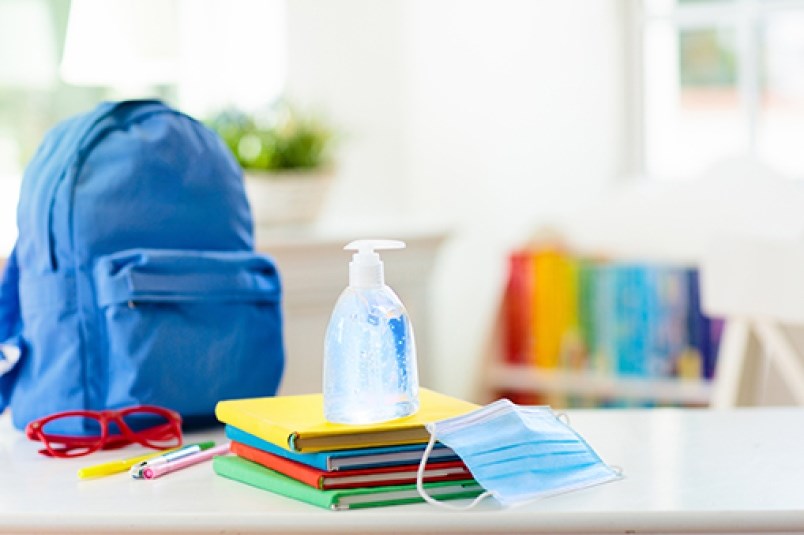In response to local teachers' concerns about COVID-19 safety protocols, the Sea to Sky School District's superintendent is reiterating a familiar line — that these decisions are largely the domain of public health officials.
On Oct.8, the Sea to Sky Teachers' Association penned a letter to the editor that ran in local newspapers.
The message appeared to suggest that teachers were concerned about the current approach of in-class learning, and it seemed to hint that educators wanted to move to hybrid online learning.
"A move to Stage 3 would mean reducing classroom density through a hybrid learning model, where fewer students would be in buildings at any one time. This move would significantly lower everyone's chances of exposure to the virus as well as fewer "cluster transmissions" stemming from school settings," reads the letter by April Lowe, the local union president.
"If parents, grandparents and everyone concerned want schools to be safer, by reducing chances for exposure through lower density and less contact in classrooms, and or the mandatory wearing of masks throughout the school day, then make your voice heard. Teachers' voices are not enough."
It's a sentiment that has been shared by the provincial BC Teachers Federation, or BCTF, as well.
The federation polled its members from Sept. 17 to 21 and found that among the 8,952 responses, only 7 per cent said COVID-19 health and safety measures were completely adequate.
A total of 60 per cent of teachers said the health and safety conditions in their school setting was either "completely inadequate" or "somewhat inadequate."
BCTF President Teri Mooring said in a news release the survey outlines how the Ministry of Education's restart plan has fallen short in making sure teachers have the necessary health and safety measures in place during this pandemic.
"A significant majority of teachers are working in schools without the necessary safety measures in place to prevent the possible spread of COVID-19," said Mooring in the release.
"These are not surprising results. Teachers have been raising concerns since July 29 that the Ministry of Education's restart plan wasn't good enough. Many teachers are working in classrooms that have no space for physical distancing or access to fresh air. In many cases, there has been no reduction in class sizes or school density. Coupled with a weak mask mandate and it's clear why so many teachers are reporting unsafe conditions."
Taking this into account, Supt. Lisa McCullough said that the school district follows directions from health authorities when it comes to wearing masks or holding in-person classes.
"Those are not decisions that our local board or our superintendent, myself, would be advising the board on. I would simply be following the direction from our government, and, again, through public health," said McCullough.
Under Stage 2, schools are being mandated to maximize in-class instruction as much as possible, so long as certain safety protocols can be enforced, she said.
In cases where it's not possible, then other measures, such as hybrid online learning can be implemented.
For example, if a class is too full, then the school district would try to find a larger space for it. If that doesn't work, masks may be mandated.
Should masks still not be enough, it's possible the school district will consider a hybrid learning model for that class specifically. But that doesn't mean it will be extended to every other class in the school district, McCullough said.
When considering whether it was possible to make changes at the school district level to set teachers' minds at ease, McCullough said that the school district has an occupational health and safety committee, which works with employees to address their concerns.
"We sit and we talk through the various items that come forward and we make a plan," she said. "I am fully confident that that collaborative team can reach out to different members and get the information that they need to bring to those tables. And that then those tables that have all the different representatives can make plans together."
McCullough also addressed a comment from a public letter authored by Alaine Brawley and PJ Elliot and shared with The Chief. The letter was regarding a public information session that was held with Vancouver Coastal Health's Dr. Mark Lysyshyn. McCullough was the host of the meeting.
"Supt. McCoullough, you stated last evening, 'People take steps that they do not need to take when we inform them,'" the letter reads. "This is a concerning and alarming statement. Unfortunately, this erodes trust. It encourages others to wonder what else they are not being informed of. It is patronizing and, quite frankly, disappointing."
In response, McCullough said, "The key message is that public health advises us on what we need to know and who needs to know it."
She said the public should follow the steps outlined by health officials and not take measures that the public hasn't been advised to take.
"I would share the view that speculation is harmful," she said. " And I would say that's all the more reason why we have to have a reasonable level of trust in knowing you would be contacted if you needed to know, and, therefore, we agree together as a community not to speculate because of the harm that it causes."




